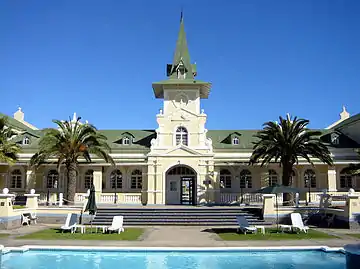Swakopmund railway station
Swakopmund railway station (German: Bahnhof Swakopmund) is a railway station serving the town of Swakopmund in Namibia. It is part of the TransNamib railway network. Its IATA code is ZSZ.[1]

Overview
Swakopmund was the starting point of the first state railway line in German South West Africa. The railway station was built in 1901, as a terminal on the Imperial Germany's colonial Kaiserliche Eisenbahn line connecting Swakopmund with Windhoek.[2] The station was designed by Willi Sander, who also later designed Swakopmund Lighthouse.[3] In 1914 the extension to Walvis Bay was completed, with a railtrack very close to the shore of the Atlantic Ocean. In 1980 this extension was replaced by an alternative route behind the dunes that allowed for higher axle load.[4]
The station building, declared a national monument in 1972,[5] today serves as a hotel and casino;[6][7] trains stop outside town. There is another former station building in Swakopmund, the O.M.E.G. Bahnhof of the private mining company Otavi Minen und Eisenbahn Gesellschaft, today housing a museum.
See also
References
- "Swakopmund, Railway Station (ZSZ) information". TheAirDB. Retrieved 4 July 2014.
- Armstrong, Kate; Bainbridge, James; Firestone, Matthew D. (2010). Southern Africa. Lonely Planet. p. 349. ISBN 978-1-74059-545-2.
- Tonchi, Victor L.; Lindeke, William A.; Grotpeter, John J. (31 August 2012). Historical Dictionary of Namibia. Scarecrow Press. p. 413. ISBN 978-0-8108-7990-4.
- Dierks, Klaus. "The Development of the Namibian Railway Network. The Rail History Until the 1990s". www.klausdierks.com. Retrieved 15 November 2012.
- Karlin, Adam (2010). Botswana & Namibia. Lonely Planet. p. 314. ISBN 978-1-74104-922-0.
- Theroux, Paul (2013). The Last Train to Zona Verde: My Ultimate African Safari. Houghton Mifflin Harcourt. p. 92. ISBN 0-618-83933-X.
- Ejikeme, Anene (22 July 2011). Culture and Customs of Namibia. ABC-CLIO. p. 85. ISBN 978-0-313-35892-0.